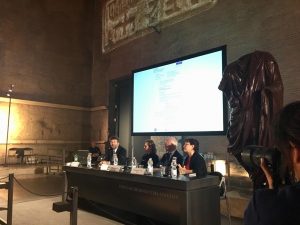NEWS Italian Minister Says Complete Funding of MEIS imminent
“The raising of the 25 million euros intended for the project of the MEIS is almost complete. I hope I will make an announcement briefly,” said Minister for Cultural Heritage Dario Franceschini last week on the occasion of the signature of the protocol between the National Museum of Italian Judaism and the Shoah in Ferrara and the Colosseum’s Archaeological Park.
The prestigious collaboration has been strongly supported by the minister, who seeks to set up “joint research and promotion projects, expertise exchanges, integrated digital communication strategies aiming to spread knowledge of the history of Judaism from the destruction of Jerusalem by Titus.”
“The protocol has been fully supported by minister Franceschini. The Colosseum’s Archaeological Park wishes for these two institutions to engage in an open and inclusive dialogue with the citizenry. They should become a laboratory of ideas and reflection stimulating debate on Judaism as well as showing the importance of the encounter with other cultures,” underlined Alfonsina Russo, director of the Colosseum Park.
MEIS president Dario Disegni was on the same page. “The agreement will allow the development of a fruitful partnership between the two institutions, with a view of promoting the presence of Jews in Ancient Rome. The community stood out for its resilience and strong identity, and some archaeological areas are very significant for the history of Italian Judaism,” he said.
Dario Disegni underlined that “After some years of intense cultural elaboration focused on the planning of the extraordinary architectural complex which will be built next to what used to be the old prison – but has been admirably restored as the centre of cultural life – MEIS moved on to the operational phase, which started on December 13, 2017, when the first major exhibition was opened by minister Franceschini’s speech in the presence of the President of the Republic. The exhibition was named “Jews, an Italian story: The first thousand years” and was curated by Anna Foa, Giancarlo Lacerenza and Daniele Jalla,” Disegni added.
That day marked the beginning of a journey which continued with another successful exhibition which has recently closed, covering the Renaissance from a Jewish perspective.
As explained by director Simonetta Della Seta, “MEIS is a lively place whose contents and spaces are expanding. The construction of the first modern building is going to start this week. Afterwards, we envision completing the museum with four more buildings to retrace symbolically the books of the Torah. The large complex which is about to be built will present a narrative as well as as an experiential museum which brings – and will continue to bring – prestige to artifacts and tales of Italian Judaism. It is tangible evidence of more than 2,000 years of Jewish presence in Italy.”
Della Seta added, “Visitors recognize MEIS as a place encouraging reception, discussion and encounter with the other. We regard it as a fundamental mission, which is intertwined with the long history of Italian Judaism.”
The event ended with a lecture on Jews in Ancient Rome by professor Fausto Zevi.
Translated by Claudia Azzalini and revised by Mattia Stefani, both students at the Advanced School for Interpreters and Translators of Trieste University and interns at the newspaper office of the Union of the Jewish Italian Communities.

